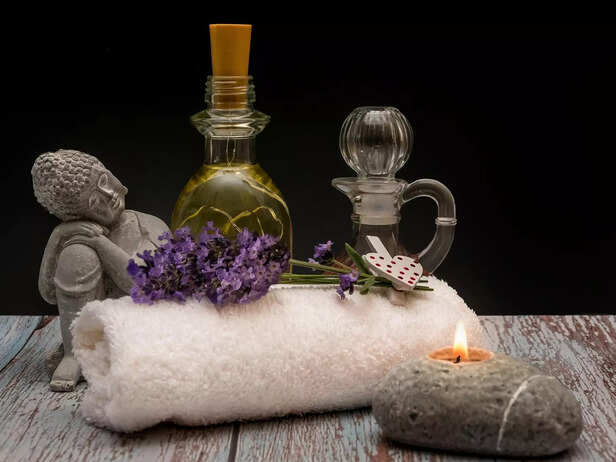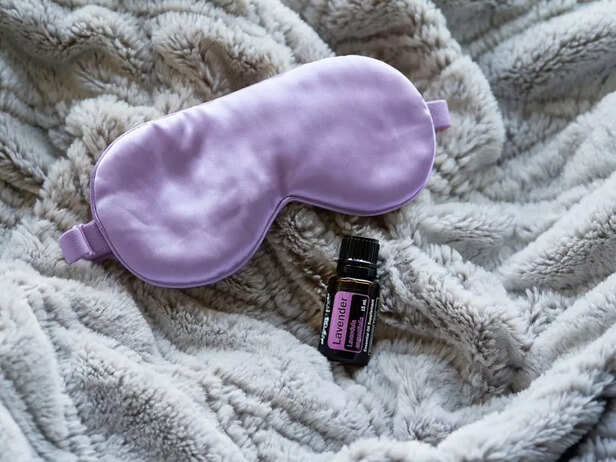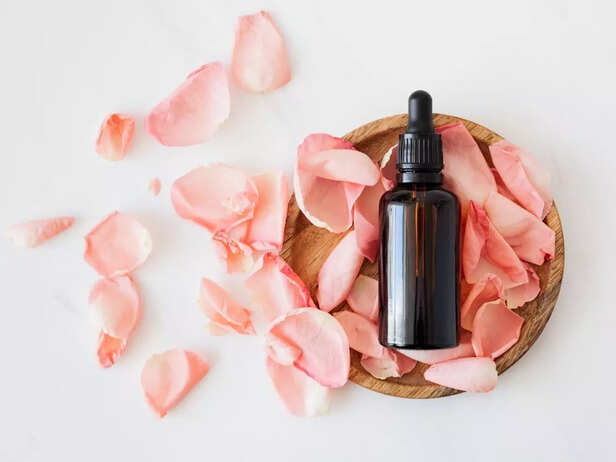Lavender Oil on Your Pillow: Better Sleep or Placebo?
Ritika | Sep 27, 2025, 14:05 IST
Lavender
( Image credit : Pixabay )
Lavender oil has been used for centuries as a sleep aid, with some people saying that only a few drops on the pillow help them catch more restful sleep. But science is still unclear. Is the soothing scent strong enough to affect sleeping patterns, or is it mind over matter, believing what one wants to believe? Both sides are examined here.
Sleep is an odd landscape, part science, part enigma. They try everything from black drapes to white noise machines, but others swear nothing is better than a familiar smell. Lavender oil, particularly when applied to a pillow, is an old-fashioned bedtime routine. It promises calmness, a slower heart rate, maybe even dreamier dreams that last longer. The question is whether it's the lavender doing its thing or just the mind making comfort out of habit.

Lavender has been linked to calmness for centuries. Romans bathed with it, and medieval physicians used it to cure headaches and insomnia. Even now, aromatherapy shops and spa countertops groan under the weight of candles, sprays, and oils infused with the scent of lavender. The aroma is light, floral, and fresh, something that cannot help but be calming in the midst of a busy day. When people retire to bed at night and breathe it in, the link with peace and sleep is immediate.
Small but intriguing research has been conducted on lavender and sleeping. It is suggested by some research that lavender oil decreases nervous system activity, reducing heart rate and blood pressure, which helps to induce sleep. A study at Wesleyan University in 2005 found that individuals who were exposed to the smell of lavender before sleeping experienced more restful sleep and increased morning energy. A study in 2012 linked lavender aromatherapy with improved quality of sleep in women who had insomnia.
But science hesitates. The research is frequently small and narrow in scope. Lavender appears to aid some, but not everyone, and how strongly it does so is still open to question. Scientists tend to cite the placebo effect, that if a person thinks lavender is going to assist, the mind might just calm down because it's instructed to do so. That isn't a failure of lavender, however. It's the mind cooperating with the body.

The concept of the placebo is usually misunderstood. People imagine it as "phony help," but the truth is more complex. Placebos illustrate just how much the brain can manipulate bodily states. If a patient knows lavender oil will result in improved sleep, the mere thought can calm anxiety, reduce breathing, and set the body up for slumber. In that respect, the pillow isn't simply a pillow with scent. It's carrying comfort.
For others, that comfort is sufficient to transform sleepless nights into controllable ones. For others, perhaps not, but the act itself, pausing a moment to add a drop, take a deep breath, and mark the end of the day, provides a rhythm that disciplines the body towards slumber. Placebo or not, the action itself can still be beneficial.

Sleep is very individual. What relaxes one individual may frustrate another. Lavender contains a strong floral pungency that some love but others find overpowering. For the highly sensitive to aroma, it could do the very reverse of relaxing. Finally, there is the issue of the sleep issues themselves. A single individual experiencing occasional restlessness may discover that lavender works for them, but for an individual with chronic insomnia or sleep illnesses, oil on a pillow will not suffice.
This is why lavender is more typically referred to as "supportive" than "curative." It can tip the scales toward sleep when body and mind are predisposed that way. But it can't reconfigure underlying issues like stress disorders, hormone imbalance, or neurological illness.
One of the most underappreciated things about lavender on the pillow is the ceremony itself. Humans need cues. When a cup of coffee tells the body it needs to wake, an evening lavender routine can instruct the mind that it must relax. The aroma over time becomes a shorthand for sleep, as if a lullaby were being carried on the breeze.
This conditioning is strong. Lavender baths or lotions are used by many parents on infants in an attempt to associate the smell with sleeping from infancy on. Adults are responsive as well. Lighting a lavender candle, drinking herbal tea, or spritzing the pillow may be the way to go. The association makes it an anchor. And anchors are as useful as any supplement.

Naturally, with lavender's reputation comes a lucrative market. Essential oil manufacturers, candle companies, and even pillow spray brands all guarantee life-altering sleep in one spritz. Marketing tends to heighten the science and amplify small promising studies into broad claims.
What’s important to note is that lavender is not a miracle cure. It’s not going to erase sleep debt caused by long work hours or counter the effects of scrolling through a bright phone screen at midnight. It can, however, be a gentle aid, a low-risk, natural option in a world full of high-tech sleep gadgets and strong prescription pills.

Lavender oil, while natural, is not without precaution. Applied directly to the skin, it sometimes irritates and undiluted oils are not to be used liberally. A few drops on the pillow is generally safe, but some find a spray mixed with water more convenient. For kids or allergy sufferers, caution should be exercised.
Another subtle aspect is the psychological dependence. If one starts to feel he or she can't sleep without lavender, the habit can become a crutch. Healthy sleep hygiene involves flexibility, not dependence on a single variable.
The response isn't a simple yes or no. Lavender oil does appear to have a quantifiable soothing effect on some, backed by small amounts of scientific evidence. Yet much of its potency can also be found in expectation and ritual. But maybe that separation is less significant than it appears. If a placebo is still eliciting genuine relief, is it somehow less legitimate?
For most of us, lavender is in a bag of tricks, dim lights, cold rooms, quiet, and a splash of floral peace. Whether psychology or chemistry, the outcome is the same: improved chances at sleep.
Explore the latest trends and tips in Health & Fitness, Spiritual, Travel, Life Hacks, Trending, Fashion & Beauty, and Relationships at Times Life!
The Allure of Lavender and the Science Behind It

Lavender
( Image credit : Pixabay )
Lavender has been linked to calmness for centuries. Romans bathed with it, and medieval physicians used it to cure headaches and insomnia. Even now, aromatherapy shops and spa countertops groan under the weight of candles, sprays, and oils infused with the scent of lavender. The aroma is light, floral, and fresh, something that cannot help but be calming in the midst of a busy day. When people retire to bed at night and breathe it in, the link with peace and sleep is immediate.
Small but intriguing research has been conducted on lavender and sleeping. It is suggested by some research that lavender oil decreases nervous system activity, reducing heart rate and blood pressure, which helps to induce sleep. A study at Wesleyan University in 2005 found that individuals who were exposed to the smell of lavender before sleeping experienced more restful sleep and increased morning energy. A study in 2012 linked lavender aromatherapy with improved quality of sleep in women who had insomnia.
But science hesitates. The research is frequently small and narrow in scope. Lavender appears to aid some, but not everyone, and how strongly it does so is still open to question. Scientists tend to cite the placebo effect, that if a person thinks lavender is going to assist, the mind might just calm down because it's instructed to do so. That isn't a failure of lavender, however. It's the mind cooperating with the body.
The Placebo Question

Relaxing buddha statue with lavender
( Image credit : Pixabay )
The concept of the placebo is usually misunderstood. People imagine it as "phony help," but the truth is more complex. Placebos illustrate just how much the brain can manipulate bodily states. If a patient knows lavender oil will result in improved sleep, the mere thought can calm anxiety, reduce breathing, and set the body up for slumber. In that respect, the pillow isn't simply a pillow with scent. It's carrying comfort.
For others, that comfort is sufficient to transform sleepless nights into controllable ones. For others, perhaps not, but the act itself, pausing a moment to add a drop, take a deep breath, and mark the end of the day, provides a rhythm that disciplines the body towards slumber. Placebo or not, the action itself can still be beneficial.
Why It Works for Some, Not for Others

Sleeping mask and lavender oil
( Image credit : Pexels )
Sleep is very individual. What relaxes one individual may frustrate another. Lavender contains a strong floral pungency that some love but others find overpowering. For the highly sensitive to aroma, it could do the very reverse of relaxing. Finally, there is the issue of the sleep issues themselves. A single individual experiencing occasional restlessness may discover that lavender works for them, but for an individual with chronic insomnia or sleep illnesses, oil on a pillow will not suffice.
This is why lavender is more typically referred to as "supportive" than "curative." It can tip the scales toward sleep when body and mind are predisposed that way. But it can't reconfigure underlying issues like stress disorders, hormone imbalance, or neurological illness.
One of the most underappreciated things about lavender on the pillow is the ceremony itself. Humans need cues. When a cup of coffee tells the body it needs to wake, an evening lavender routine can instruct the mind that it must relax. The aroma over time becomes a shorthand for sleep, as if a lullaby were being carried on the breeze.
This conditioning is strong. Lavender baths or lotions are used by many parents on infants in an attempt to associate the smell with sleeping from infancy on. Adults are responsive as well. Lighting a lavender candle, drinking herbal tea, or spritzing the pillow may be the way to go. The association makes it an anchor. And anchors are as useful as any supplement.
Commercial Hype vs. Reality

A woman
( Image credit : Pexels )
Naturally, with lavender's reputation comes a lucrative market. Essential oil manufacturers, candle companies, and even pillow spray brands all guarantee life-altering sleep in one spritz. Marketing tends to heighten the science and amplify small promising studies into broad claims.
What’s important to note is that lavender is not a miracle cure. It’s not going to erase sleep debt caused by long work hours or counter the effects of scrolling through a bright phone screen at midnight. It can, however, be a gentle aid, a low-risk, natural option in a world full of high-tech sleep gadgets and strong prescription pills.
The Safety Side

Lavender oil
( Image credit : Pexels )
Lavender oil, while natural, is not without precaution. Applied directly to the skin, it sometimes irritates and undiluted oils are not to be used liberally. A few drops on the pillow is generally safe, but some find a spray mixed with water more convenient. For kids or allergy sufferers, caution should be exercised.
Another subtle aspect is the psychological dependence. If one starts to feel he or she can't sleep without lavender, the habit can become a crutch. Healthy sleep hygiene involves flexibility, not dependence on a single variable.
So, Better Sleep or Placebo?
For most of us, lavender is in a bag of tricks, dim lights, cold rooms, quiet, and a splash of floral peace. Whether psychology or chemistry, the outcome is the same: improved chances at sleep.
Explore the latest trends and tips in Health & Fitness, Spiritual, Travel, Life Hacks, Trending, Fashion & Beauty, and Relationships at Times Life!
